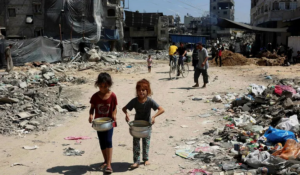One year on – five things the war on Gaza taught us about the Palestinian struggle

Palestinian children carry pots of soup near a food distribution point in the northern Gaza Strip, on 18 September 2024
Ramzy Baroud writes in The Palestine Chronicle on 9 October 2024:
The last year of a relentless Israeli war on Gaza, and bloody raids and violence in the West Bank have been largely viewed in terms of their horrific humanitarian outcomes: the unequaled killing of tens of thousands, the obliteration of Gaza and the destruction in the West Bank.
While humanitarian urgency must indeed be a priority, other factors are also deserving of consideration, especially as we mark the one-year anniversary of the ongoing war. Even though the mass killing is yet to end, there are several conclusions that can already be drawn about the long-term consequences of the war.
One, Palestinians, despite the military occupation, the siege and the numerous failures of their leadership, remain political actors, with powerful agency.
This agency does not stem from any superficial achievements of their autocratic leadership or the still symbolic recognition of the state of Palestine, but the collective resilience and power of ordinary Palestinians in Gaza and throughout Occupied Palestine.
The war in Gaza would have looked different if Palestinian society broke down in the face of the war machine, fragmented into fighting factions or grew desperate in the face of impossible pressures – war, unprecedented destruction, acute famine, etc. This fact alone reassures us that the Palestinian people’s destiny will not be that of erasure or even marginalization, but of continuity and even future prosperity.
Two, that Arab societies, however consumed with their own struggles, social and political challenges, remain united in perceiving the Palestinian cause as a top Arab priority. This has allowed many Arab governments to reiterate their position regarding the centrality of the Palestinian cause. Though current circumstances may, for now, prevent some Arab societies from being direct participants in turning their devotion to Palestine into tangible and practical support, the future shall prove that the renewed centrality of Palestine in Arab political and popular discourses will have its own weight and value.
The same logic applies to the Muslim Ummah, which has never been so united around a cause in decades as it is now united around Palestine. This can be felt in all Muslim countries, and among Muslim communities around the world, especially in the West.
The future shall reveal more regarding the meaning of the return of Palestine to the embrace of Arabs and Muslims. However, one can already conclude that the resilience of the Palestinian people has, once more, refocused the attention on Palestine as the leading cause of all Arabs and Muslims.
Three, though international law remains as ineffective as ever, the bloody war in Palestine is creating rifts between the Global South and the Global North.
